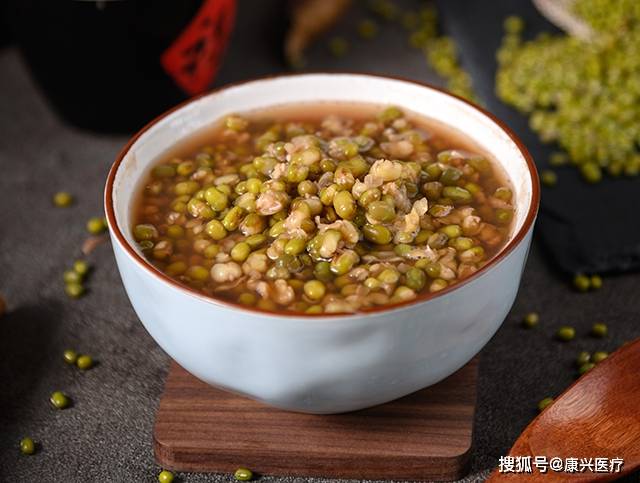Although the beginning of autumn has arrived, the weather is still in the midst of intense heat, making it unbearable. In such hot weather, many people like to drink mung bean soup to cool off, and Aunt Li is one of the avid fans.
In her mind, mung bean soup is not just an ordinary drink, but a precious remedy for cooling off in the summer. The clean and refreshing taste seems to dispel the heat, cleanse the irritability, clear heat, detoxify, and bring a refreshing feeling from the inside out.
However, during a casual chat, someone informed her, “Although mung bean soup is delicious, people with high blood pressure should never drink it. So and so had a stroke after drinking a bowl of ice mung bean soup.” This statement undoubtedly served as a warning bell for Aunt Li, who suffers from high blood pressure.
Aunt Li, who has always been careful in managing her blood pressure, couldn’t help but feel conflicted. This sudden news surprised and worried her: “Can people with high blood pressure really drink mung bean soup?”
In fact, mung beans themselves are not an absolute taboo for people with high blood pressure. Mung beans are cool in nature and have good effects in clearing heat, detoxifying, diuresis, and lowering blood pressure. Consuming mung bean soup or porridge can help clear heat and invigorate qi. The polysaccharides in mung beans can increase the activity of serum protease, achieving the effect of reducing blood lipids. Additionally, the potassium element in mung beans can help regulate the body’s water and salt balance, and moderate consumption can help high blood pressure patients control their blood pressure.
Whether one can drink mung bean soup depends on individual physical condition and consumption quantity. Although mung beans have diuretic properties, excessive consumption may disrupt the body’s electrolyte balance, especially for high blood pressure patients with impaired kidney function or those taking diuretics, caution is advised. Excessive consumption of mung beans, especially for those with weak spleen and stomach, may lead to indigestion such as diarrhea.
In hot summers, we all enjoy eating cold foods, and most people like to freeze mung bean soup. However, people with high blood pressure who consume overly cold foods can stimulate the blood vessels, causing vasoconstriction, leading to sudden increases in blood pressure, even triggering acute cardiovascular accidents such as acute myocardial infarction, acute cerebral infarction, and more. This explains the incident Aunt Li heard about where someone had a stroke due to drinking ice mung bean soup.
While mung beans are a nutritious ingredient suitable for most people, there are indeed some who should avoid consuming them. Drinking incorrectly not only fails to relieve heat but can also harm the body:
1. Elderly, children, and individuals with weak constitutions.
Since mung beans contain more protein than chicken, the high molecular protein needs to be transformed into small peptides and amino acids under the action of enzymes for absorption by the body. Such individuals generally have weaker gastrointestinal function, making it difficult to digest mung bean protein in a short time, leading to indigestion and diarrhea.
2. People with kidney disease.
Patients with kidney disease need to strictly control their protein intake, and the high protein content in mung beans may pose an additional burden on their kidney function. Excessive protein intake not only burdens the kidneys but may also lead to the accumulation of metabolic products in the body, affecting overall health. It is advisable for this group to consult a doctor or nutritionist before consuming mung beans.
3. Individuals with autoimmune diseases such as rheumatoid arthritis.
They often experience varying degrees of gastrointestinal symptoms. The cool nature of mung beans may exacerbate gastrointestinal discomfort, leading to diarrhea, stomach pain, and other symptoms. It is important to pay attention to the nature of the ingredients and individual constitution to avoid triggering or worsening the disease.
A friendly reminder: in summer, it is important to replenish fluids. Drinking too little water can lead to high blood viscosity, potentially leading to strokes. Don’t wait until you are thirsty to drink water; it’s better to cultivate the habit of drinking water before becoming thirsty, frequently in smaller quantities rather than in large quantities at once.
The above information is for reference only; adhere to medical advice when applicable. Thank you for reading. If this article was helpful to you, please consider liking and sharing it with those in need. Feel free to leave comments in the comment section to jointly create a high-quality healthy lifestyle!


